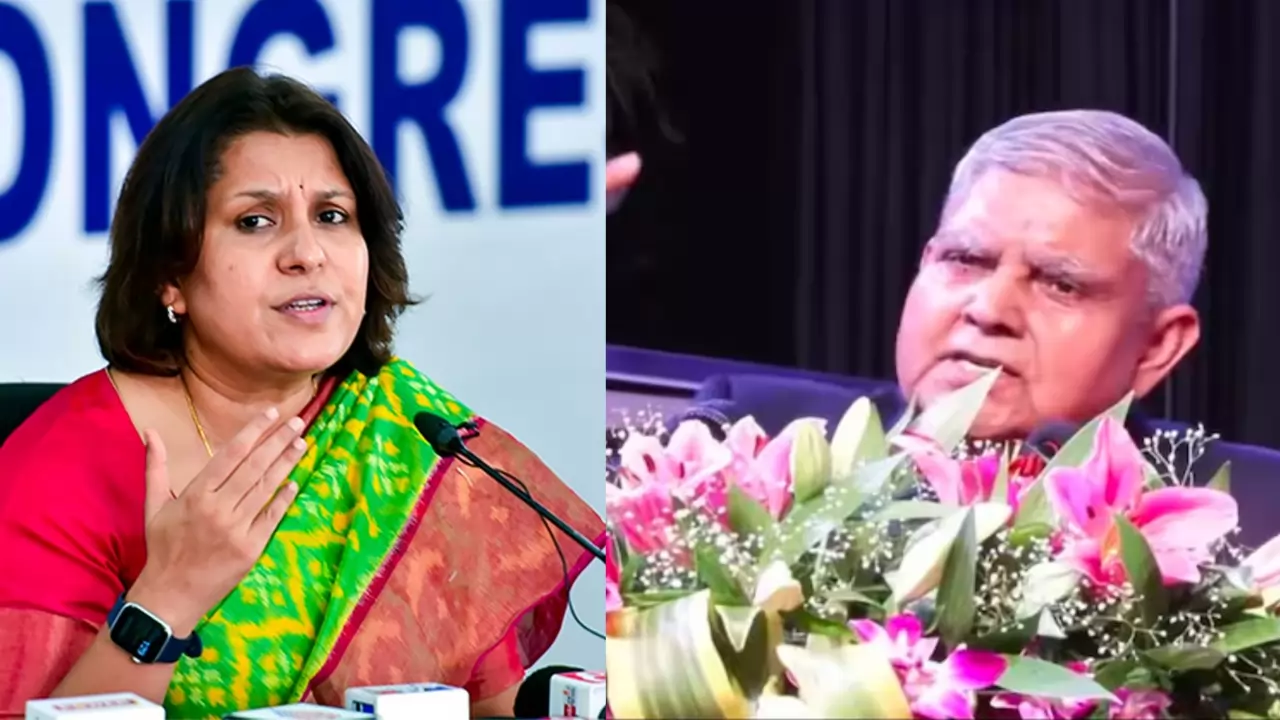
Supriya Shrinate, Vice President Dhankhar (X/@SupriyaShrinate)
Vice President Jagdeep Dhankhar, during an address in Sikar, Rajasthan, on Saturday, expressed concern over what he termed as a “new illness” afflicting the country's students— the growing trend of pursuing education abroad. He referred to this phenomenon as a form of “foreign exchange and brain drain,” noting that the commercialization of education has a detrimental effect on its quality, which poses a threat to the nation’s future.
Speaking at a private educational institution’s event, Dhankhar said, “There is a new illness among children — the dream of going abroad. Children are excited to go overseas, but they do not assess which institution or country they are headed to.”
Dhankhar highlighted that an estimated 13 lakh students have gone abroad in 2024 alone. He raised concerns about their future and pointed out that people are now beginning to realise the brighter prospects that could have been achieved had these students pursued their education in India.
Furthermore, he emphasised that this trend has created a “6-billion-dollar hole in our foreign exchange reserves.” Dhankhar called for increased efforts to raise awareness among students about the impact of this brain drain and foreign currency loss, urging stakeholders to take action to mitigate it.
उपराष्ट्रपति जगदीप धनखड़ का कहना है ‘आज देश के बच्चों को विदेश जाकर पढ़ाई करने की नई बीमारी लग गई है’
— Supriya Shrinate (@SupriyaShrinate) October 20, 2024
इनकी अपनी बेटी अमेरिका और इंग्लैंड में पढ़ीं
हर इंसान को आज़ादी है वो कहाँ पढ़े, कहाँ रहे
लेकिन अपने बच्चे के लिए और बाक़ी देश के बच्चों के लिए इतने अलग मापदंड तो ढोंग है! pic.twitter.com/Z7SQcM608k
Congress spokesperson Supriya Shrinate responded to his remarks in a video posted on X, stating, “Vice President Jagdeep Dhankhar says that today's children are infected by a ‘new disease’ of going abroad for studies, while his own daughter studied in the U.S. and U.K. Everyone has the freedom to study wherever they wish, but having different standards for one's own child and the rest of the nation's children is hypocrisy.”
Dhankhar also stressed the negative implications of turning education into a business, stating, “Imagine if $6 billion were spent on improving the infrastructure of our educational institutions, what would our situation be today? I call it foreign exchange and brain drain. This should not be the case. Institutions must make students aware of the circumstances abroad.”
He underscored the importance of using technology to provide quality education, warning that the commercialization of education is “leading to exploitation in some cases,” which is a matter of serious concern.





Copyright © 2026 Top Indian News
